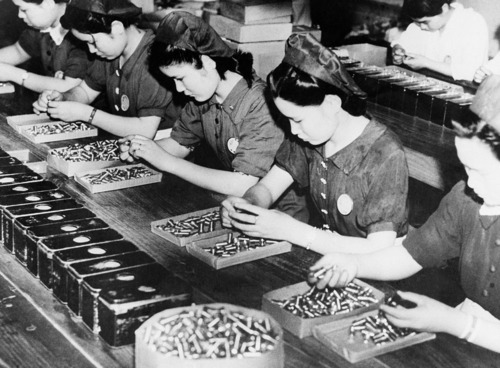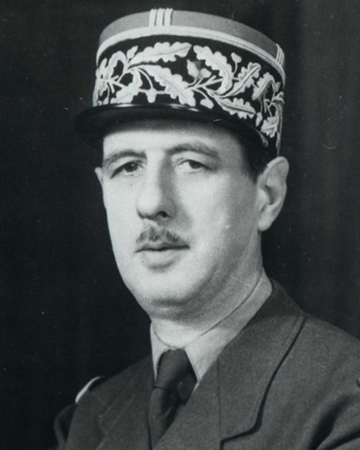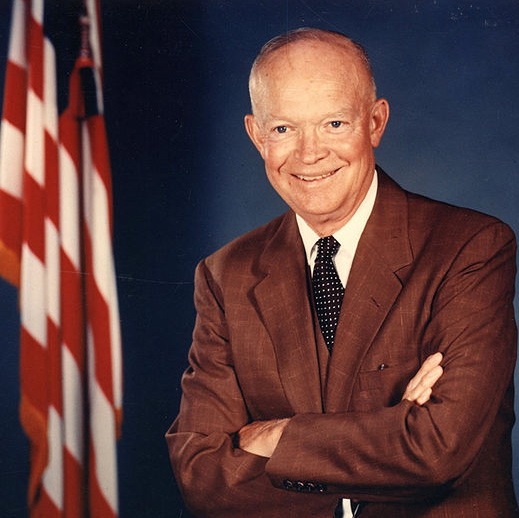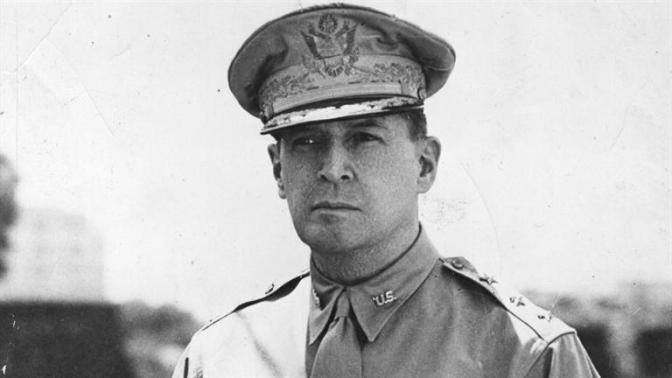THE BLOW OF THE SIXTH TRUMPET
The fulfillment of the prophecy after the blowing of the fifth trumpet (the victories and the invasion of the Axis Powers in Europe and Asia) is the first woe. During the first woe, the victory of Hitler’s Third Reich was almost at hand. They have conquered and subdued France! Britain could not stand the attacks and bombing raids of Germany’s Air Force. If Japan and Italy had supported Germany in attacking Britain, the war would have been over. The Holy Roman Empire would have reemerged!
Because of the big mistakes of the Axis Powers, especially Germany and Japan, they were defeated. Hitler left Operation Sea Lion (invasion of Britain) and shifted to Operation Barbarossa (invasion of Russia). This gave Britain an opportunity to breathe and to recuperate their forces. Even the government in exile established in England by French officials, led by Charles de Gaulle, was given the opportunity to revive and launched a move for their freedom with the help of guerrillas in their country. What further aggravated the problem of the Axis Powers was Japan’s bombing of Pearl Harbor.
Germany was supposed to have a lone enemy left, the nearly defeated Britain, but the United States was drawn into war! And due to Hitler’s mistake, Russia rejoined the Allies! These events posed a serious threat in the coming second woe. Let us read the events that will take place when the sixth angel blows his trumpet:
Revelation 9: 12-21 RSV
“The first woe has passed; behold, two woes are still to come. Then the sixth angel blew his trumpet, and I heard a voice from the four horns of the golden altar before God, saying to the sixth angel who had the trumpet, “Release the four angels who are bound at the great river Euphrates.” So the four angels were released, who had been held ready for the hour, the day, the month, and the year, to kill a third of mankind. The number of the troops of cavalry was twice ten thousand times ten thousand; I heard their number. And this was how I saw the horses in my vision: the riders wore breastplates the color of fire and of sapphire and of sulphur, and the heads of the horses were like lions’ heads, and fire and smoke and sulphur issued from their mouths. By these three plagues a third of mankind was killed, by the fire and smoke and sulphur issuing from their mouths. For the power of the horses is in their mouths and in their tails; their tails are like serpents, with heads, and by means of them they wound. The rest of mankind, who were not killed by these plagues, did not repent of the works of their hands nor give up worshiping demons and idols of gold and silver and bronze and stone and wood, which cannot either see or hear or walk; nor did they repent of their murders or their sorceries or their immorality or their thefts.”
We have learned that an angel, if their task is to preach the gospel, is a messenger of a church; but, if the angel’s work is related to war, its fulfillment is a leader of a nation. The four angels mentioned in the blow of the sixth trumpet had numerous troops of cavalry; and from the horses’ mouths issued fire and brimstone that killed many people (aerial cavalry). Therefore, the task of the four angels were related to war. They are the four leaders of the four countries or ministers of war.
The truth in Prophet Jeremiah’s prophecy about the curse and wrath of God against Israel is irrefutable. It is the result of turning their back to God and their disobedience to His commandments. God’s wrath wasn’t abated and will be manifested until the last days at the ends of the earth! A firm testament to this is the holocaust in Germany.
Now let’s find out why millions of non-Jewish people were included in God’s punishment. God cursed Israel because they have sinned and turned away but, many casualties of war were not Jews. It was because of people’s worship of false idols made of gold, silver, bronze, stone, and wood which can neither see, nor hear, nor walk.
The Vatican or the Pope in Rome was still involved because he and their religion (Roman Catholic Church) coaxed people to worship idols and false gods. In fact, up to this day and until the blowing of the seventh trumpet, millions upon millions of people will not repent from worshiping idols (and false gods) which the Almighty God truly abhors. God will fully manifests His wrath on the Day of Judgment!
Let us now look at the events after the United States got involved in the war because of Japan’s erroneous move. In 1942, the Allies’ leadership often gathered — they were Roosevelt, Stalin, and Churchill. They laid out plans on how to first end the war in Europe, after which they will confront the Japanese in Asia.
Just like the Axis Powers, the Allies prepared for a full-scale war. The democratic government of the United States and of Britain had strengthened their political power. They poured their economic resources to the needs of war. They mandated factories of cars and refrigerators to primarily manufacture planes and tanks for war. Consumer goods such as shoes and sugar were rationed. Citizen’s wages were controlled and regulated.

As the men enlisted in the army and the war industry expanded, millions of women took over significant jobs. Women became skilled workers — manufacturing ships and airplanes and also making ammunition. They also served in military offices. In Britain and the United States, women served at the Armed Forces as assistants in important jobs — driving ambulances and trucks, delivering warplanes, decoding messages, and assisting in anti-aircraft sites.

Subdued by Germany, the French resistance group led by Charles de Gaulle boldly fought the Nazi conquerors through guerrilla tactics. Even French women helped in their campaign, such as Marie Fourcade who led 3,000 people in an underground movement. She also helped the downed Allied pilots to escape.
Because of the wrong decision by Hitler and General Tojo, four powers (United States, Britain, Russia and France) faced them at the beginning of the second woe. The four angels released in the river of Euphrates were Roosevelt, Churchill, Stalin, and de Gaulle. The prophecy of the sixth angel’s blow of the trumpet has been fulfilled.
Meanwhile on December 20, 1942, a great earthquake occurred in Erbaa, Turkey and 1,100 people died. More than 5,000 buildings were destroyed.
The changes in war started during 1942 to 1943, when the Allies succeeded in several battles. These took place in North Africa and in Italy. In Egypt, under General Bernard Montgomery of Britain, they fully halted the invasion of General Rommel of Germany on El Alamein. Axis forces were driven back to Libya up to Tunisia. Dwight Eisenhower, a general of the United States, took charge of the joint forces of Britain and United States in Morocco and in Algeria. They came from the north and defeated Gen. Rommel’s soldiers, who surrendered on May, 1943.
The victory in North Africa allowed the Allies to cross the Mediterranean towards Italy. And in 1943, the combined forces of Britain and United States reached Sicily and southern Italy. It took them about a month to defeat the Italian army.
The Italians became fed up with Mussolini and removed him from power. The new government of Italy signed an armistice but the war did not end there. Hitler sent troops to save Mussolini, which strengthened the morale of the Italians who were still fighting in the west. Within 18 months, the Allies slowly moved up to the Italian peninsula. They suffered grave casualties against the German resistance. In the same token, the battle also caused significant damage to Hitler’s forces because he was forced to fight in another field.
Another major change for the Axis Powers took place in the Soviet Union. Following their successful invasion in 1941, the Germans were stopped outside Moscow and Leningrad. And in 1942, Hitler launched a new offensive. This time, he targeted the oil-rich lands of the south. But his soldiers just reached the city of Stalingrad. The battle of Stalingrad was the most costly. Hitler was determined to take the favored city of Stalin. Likewise, Stalin was determined to defend his city. The fierce battle began when the Germans encircled the city. Similarly, the Russians surrounded their German rivals.
And as winter approached, intense fighting raged in the streets and in the houses. For two weeks, both sides fought inside one building. A German officer wrote:
“Corpses are strewn in the cellars, on the landings and on the staircases.”
Trapped inside without food and ammunition, there was no hope of rescuing the German commander. They finally surrendered in 1943. More than 300,000 German soldiers were wounded or dead in the battle of Stalingrad, not including those who surrendered.
After the battle of Stalingrad, Stalin launched a counter attack. The Red Army conducted an offensive and attacked the German forces stationed in Leningrad. The communists successfully pushed back the Germans. Hitler’s forces suffered tremendous loss in the lives of his soldiers and supplies.
Meanwhile, on September 10, 1943, a strong earthquake hit Tottori, Japan and 1,190 people persihed. Nearly 7,500 houses were damaged and destroyed in the Tottori area. The earthquake was felt from Niigata to Kumamoto. Another earthquake occurred on November 11, 1943, in Ladik, Turkey and more than 4,000 people died. Almost 75% of houses were destroyed in the Ladik-Vesirkopru area.

By 1944, the Allies were fully prepared for the second front of war in Europe — the invasion of France. General Dwight Eisenhower was made the supreme Allied commander. He and the leaders of the Allies faced a major task, planning the operation, and assembling soldiers and supplies to carefully prepare the way for their planned invasion.
The Allies frequently sent bombers to fly over Germany. They targeted factories and destroyed planes parked at airports that could be used against the Allies. They also bombed many cities in Germany.
June 6, 1944 was the date chosen by the Allies, and which they called D-Day, for the invasion of France. Almost 176,000 Allied troops crossed the English Channel. From their landing craft, they fought their way to the beach through underwater mines and the successive firing of machine guns. Others crawled under intricate fences of plants in Normandy until they arrived at the German fortress to destroy it. Afterwards, they proceeded to Paris. Meanwhile, other Allied forces cruised at sea from Italy to the southern part of France.
In Paris, French resistance rose up against the invading Germans. And because of the difficulties faced from all sides, the Germans retreated. On August 25, 1944, Paris was completely liberated by the Allies. The citizens of Paris happily greeted their liberators. And within a month, the entirety of France was liberated.
As the Allies were fighting to liberate Europe, the war in Asia against the Japanese raged continuously. The war in Southeast Asia and the Pacific were very different from the war in Europe. Most of the battles took place at sea, on small islands, or in remote forests. In the beginning, the Japanese were winning. But by mid-1942, the winds have changed.
The major turning point in the Pacific conflict took place in May and in June, 1942. Just six months after the bombing of Pearl Harbor, US warships and warplanes destroyed two Japanese fleets in the battle of Coral Sea and Midway Island. This success of the United States greatly weakened the Japanese naval power and restrained their attacks.

After the battle of Midway, the United States launched an offensive. And during the summer, under the leadership of General Douglas MacArthur, the United States Marines landed at Guadalcanal in the Solomon Islands. This was the first step in their “island hopping” campaign. The goal of this campaign was to recover some islands conquered by the Japanese. The recovered islands will serve as stepping stones for their goal. As such, America’s forces gradually advanced towards Japan.
The Americans set up airports in the retrieved islands to bring the battle closer to Japan. By 1944, American warships were already stationed in a blocking positions near Japan. Meanwhile, bombing raids devastated Japan’s industries and cities.
And on October, 1944, Douglas MacArthur began reclaiming the Philippines from Japan. Meanwhile, the British were pushing back the Japanese to the remote forests of Burma and Malaya. Despite these defeats, some militarists among the Japanese government rejected any notions of surrender.
Even Hitler scornfully refused to surrender. He stated:
“If war is to be lost, the nation also will perish.”
After liberating France, the Allies began the battle towards Germany. And while the Allies were advancing toward Berlin in December, 1944, the Germans launched a massive counter attack. Hitler used every force up to the last fiber of their strength.
The bloody war in the Battle of the Bulge of both sides had caused severe loss and destruction. The Germans were able to push back the Allies in some areas. The “Battle of the Bulge” slowed down the Allied invasion but that was the last of Hitler’s victory. At the same time, Germany was already struggling with unrelenting aerial bombers from the Allies. The Allies bombarded the military bases, factories, railroads, oil depots, and cities.
As 1945 commenced, the Germans could no longer defend themselves in the air. The vast industrial city of Hamburg was nearly destroyed within ten days of bombing. In the same year (February, 1945), a raid on Dresden killed 135,000 people. Victory was within reach for the Allies but serious and intense fighting raged on. And before the end of April, American and Russian troops met and warmly shook hands in Elbe River. Everywhere, the Axis soldiers began to surrender.
Meanwhile in Italy, the guerrillas have captured and killed Mussolini. In Berlin, Hitler, too, knew that the end was near. As the Russian soldiers invaded the city, Hitler committed suicide in his underground bunker. Hitler reaped the consequences of his wrong decisions. And on May 7, 1945, Germany surrendered. The war ended in Europe the next day and they declared it “V-E Day” (Victory in Europe). Millions were delighted and celebrated the news. Yet, the gloom and misery from the six-year-war will remain forever in the minds and hearts of many people.
After winning the war in Europe, the Allies poured their forces to defeat Japan. In mid-1945, most of the Japanese Navy and Air Forces were damaged and destroyed, but they still have two million soldiers. The Allies perceived that the road to victory was still a long one and will be very expensive.
Some American officials estimated it would be very expensive to invade Japan; to conquer and besiege to Iwo Jima and Okinawa. The Japanese have already shown that they will fight till death rather than surrender. The Allies have witnessed the “kamikaze” of young Japanese pilots who commit suicide for their country. They were deliberately nose-diving their planes full of bombs to the ships which heavily impaired the Allies.
As the Allied leaders were planning the invasion of Japan, some scientists offered an alternative way to end the war. Since 1900, scientists have discovered an element that when separated and broken down to its atoms, creates pure energy. In military terms, this means that it could create an immense explosion never before seen in the world.
During the war, some of the Allied scientists who were refugees from Germany hastened to develop atomic technology. On July, 1945, in Ala-mogordo, New Mexico, they successfully tested the first atomic bomb. The news about the strong and powerful destroyer was relayed immediately to President Harry Truman of America.
During the conference of Truman and the Allied leaders in Potsdam, Germany, they agreed to warn Japan to surrender or face complete destruction. The Japanese ignored the warning until the deadline arrived.
Thus, on August 6, 1945, an American warplane dropped an atomic bomb in the middle of Hiroshima. The residents witnessed an intensely bright flash of light, which was soon followed by massive destruction.
Four square miles of the city of Hiroshima was flattened by the bomb. And in an instant, 70,000 people were killed! In the months that followed, more people died from radiation due to exposure to radioactive materials.
Truman sent another warning to the Japanese that if they would not surrender, “expect a rain of ruin from the air, the like of which has never been seen on this earth”. Meanwhile, Russia declared war on Japan (this was a breach of their agreement of neutrality) and within two days, the Soviet Union invaded Manchuria which was colonized by Japan. (Russia has their own motive for attacking Japan). And only a few hours after the Russian attack, a second atomic bomb was dropped by the United States on Nagasaki, instantly killing more than 40,000 people.
In spite of these, there were members of the cabinet who want to continue fighting. However, there were some who disagree. Because of this, on August 10, Emperor Hirohito intervened — an act not expected from an emperor — and forced the Supreme Council for the Direction of War to accept the terms of the Allies. Unbeknownst to many, the true reason why Japan was forced to surrender was because of the additional aggression against Russia. The “atomic bomb” was only a good excuse for their surrender. Thus, on September 2, 1945, the formal peace treaty was signed on the American battleship “Missouri” which was anchored at Tokyo Bay. The Second World War finally ended. Like Hitler, Japan reaped the wrong decision of General Tojo when he ordered the bombing of Pearl Harbor.
The Second World War was over but the events in the blowing of the sixth trumpet, which is the end of the second woe, was not yet finished. This will be our next topic together with the seventh trumpet.